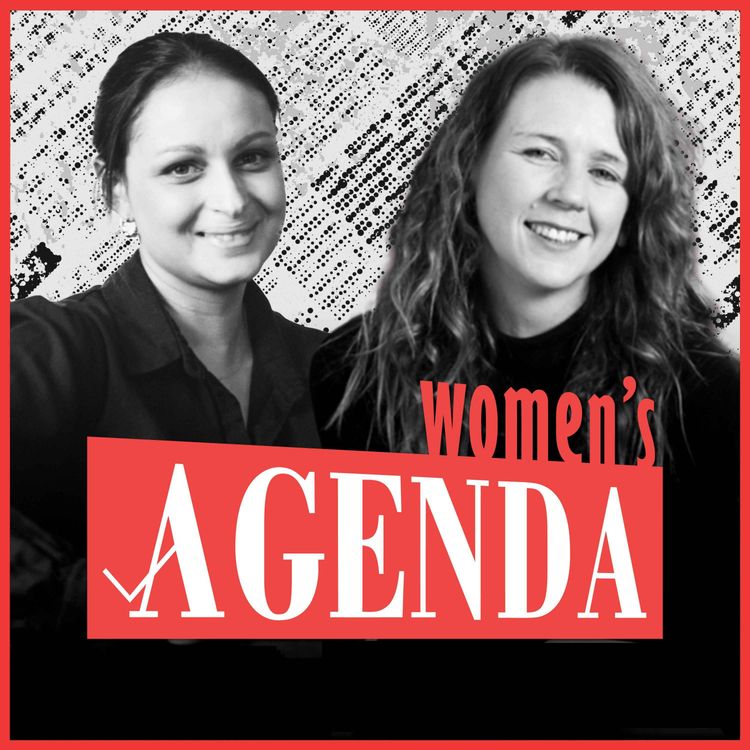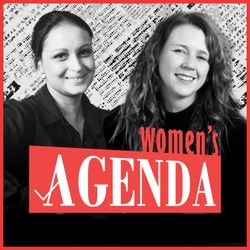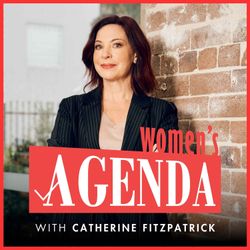Share

The Women's Agenda Podcast
The death of Zomi Frankcom in Gaza
Season 6, Ep. 13
•
This week, we learned the devastating news that Australian aid worker, Zomi Frankcom, was killed in an Israeli air strike in Gaza. The news has shocked Australia and sparked even greater outrage amongst Australians over the humanitarian crisis in Gaza.
Also this week, Tarla Lambert and Angela Priestley chat about the appointment of Sam Mostyn as Australia’s next governor-general, free contraception in Canada, an unusual economic win for women, plus why everyone in Japan will be named ‘Sato’ in 500 years’ time.
Stories discussed this week:
- Canada’s government to offer free contraception to millions of women
- Samantha Mostyn AO appointed as Australia’s next governor-general
- Humility, grace, intellect: Sam Mostyn is an inspired choice for governor-general
- Australian woman reported to be one of four foreign aid workers killed in Israeli air strike
- ‘Larger than life’: Tributes flow for Australian aid worker Zomi Frankcom and her outstanding legacy
- Women in Australia set to inherit $3.2 trillion in the country’s largest wealth transfer: Research
- Oppressive marriage laws in Japan might see everyone named Sato in 500 years’ time
The Crux is produced by Agenda Media, the 100% women founded and owned media business, publishing the daily news publication Women's Agenda.
Producers: Olivia Cleal and Allison Ho
More episodes
View all episodes

Epstein files? But You don't smile!
22:02|This week, we talk about the language, the theories and the networking in the Epstein files. From influential doctors with big social followings to royals, presidents and former prime ministers. Plus, a couple of wins, including why thousands of women will soon be arriving in Melbourne to talk about gender equity. Stories discussed this week include: Minnesota woman dragged from car by ICE agents gives testimony in DCWhy thousands of feminist leaders will soon arrive in MelbourneThe powerful men named in the latest Epstein files releaseThe influential doctor mentioned 1737 times in the Epstein files Trump lashes out at yet another female journalist who presses him on Epstein
Davos men, Coalition split, About those 'wine moms' and a Jan 26 idea
27:30|Wrapping up some of the top stories of the week we head to Davos, Canberra, Minnesota and back home again. On the agenda is extreme wealth, the lack of women at the World Economic Forum, the self-indulgence of some in politics and how "Wine Moms" became a thing and we also look at an excellent idea for addressing Jan 26. Key stories discussed this week include: Davos remains a festival of men despite (mostly) man-made risks we all faceSussan Ley “disrespected” us claim Nationals who have managed to make another week about themConservative media blame ‘wine moms’ as protests over ICE violence growWhy January 26 is not a date to celebrate and staying silent is not enough
Start drinking, as one EU leader suggested? No. Others ideas for a chaotic 2026
23:38|Hello 2026! And it's been a chaotic start already. Is the answer to start drinking, as one female EU leader suggested this week? We have a better idea instead. Also, Elon Musk’s Grok starts making thousands of sexualised deepfake images. Did we expect anything less? And why setting a health and wellness goal or intention for 2026 is a good idea. Plus, much more! This is our wrap of some of our biggest stories of the week. Stories discussed this week include: We don’t need a drink. We need more women in charge Grok, and how the algorithms aren’t psychologically safe for any of usWomen founders on their top health or wellness focus in 2026 — and whyThe Women's Agenda Podcast is produced by Agenda Media, publisher of Women's Agenda. Sign up for our free daily newsletter here and support our work by becoming a member here.
A week we will never forget
24:45|Australia is coming to terms with the horrific attack on the Jewish community in Bondi on Sunday night. Tarla Lambert-Patel and journalist Dinushi Dias sit down to unpack what happened, what it means and where we go next. They also break down some of the biggest stories on Women's Agenda this week. And find some hope in what has been a horrible week we will never forget. The Women's Agenda Podcast is published by Agenda Media, publisher of Women's Agenda. You can subscribe to our free daily lunchtime update and support our work.
Bring back 'masculine energy'! And is Pauline Hanson closing the gender pay gap?
25:45|Pauline Hanson gets Barnaby Joyce into the party, as well as a substantial pay rise as leader. Is that actually... a win? Also, the US co-founder calling for public hangings and for the world to get more "masculine energy". Plus, the social media ban is officially here, and everyone from teenagers to parents, politicians and media barons have something to say about it. And what's with the outrage over Anika Wells' travel expenses? We dive in. Stories discussed this week include: A rare case of a man’s move resulting in a woman getting a 100k pay bumpAnother billionaire tech bro declares world needs more ‘masculine energy’A social media ban won’t save us from harms online. Educating us willThe outrage over Anika Wells says more about us than it does about her
How everyday products and services are weaponised by perpetrators
32:37|Tech-facilitated abuse continues to grow as a dangerous part of gender based violence. This includes everyday financial products and services being weaponised by perpetrators to inflict harassment, terror and surveillance on their victims. One person who has been instrumental in examining the extent of the issue and how common services and products can do more to address this type of abuse, is Catherine Fitzpatrick She is a leading expert on disrupting financial abuse and gender biases through more innovative product and service design. And she joins the podcast for a fascinating but at times disturbing discussion on how this type of abuse is occurring, its prevalence, but then optimistically, the empowering actions both consumers and businesses can deploy to help stop it. Catherine has been leading industry-wide reforms. She’s advised the government on financial abuse policy and pioneered the financial safety by design framework, which is helping leading brands protect customers, manage risk and strengthen trust. She uncovered widespread abuse in online banking transactions while working as a banking executive in 2019, which led to her spearheading whole industry reforms to crack down on the practice. Catherine recorded this conversation with Women's Agenda on the 3rd December. And there’s much to learn, not just about how businesses and consumers can respond to the weaponisation of products and services, but also how she channelled a significant career curveball into a clear mission that is having real results. You can learn more about Catherine here.
An MP’s attention-seeking stunt for ‘women’s rights’ and a billionaire’s wild rant
20:02|Wrapping up another week on Women's Agenda, we explore the parliamentary stunt from a certain politician claiming she was supporting women’s rights. Plus, the wild rant from a billionaire claiming taxes almost "ruined" his life, and the reminder offered again this week that a woman celebrating epic success online can still trigger misogyny. Plus, we find the wins in the latest national snapshot from the Workplace Gender Equality Agency scorecard for Australia, where there has been an uptick in the share of paid parental leave being taken by men. The Women's Agenda Podcast is published by Agenda Media, the 100% all female owned and run media business. You can check out all the latest stories and discussed on our webste here.
May I meet you? Asks a billionaire + Glass cliff cracks
24:58|We wrap up the top stories of the week! Including the latest big party appointments and firsts for women, the cracking glass cliffs and why a billionaire thought it was a good idea to share his dating advice.Stories discussed this week include: NSW Liberals elect Kellie Sloane unanimously as leader‘May I meet you’? How a billionaire’s pickup line went viral Look away. Sussan Ley’s glass cliff is definitely starting to crack Even more ways police failed Hannah Clarke and her children revealedWomen's Agenda is published by the 100% women-owned and run Agenda Media.Check out more on the stories discussed today at Women's Agenda, where you can also sign up for our free daily newsletter. Keen to support our work? Become a Women's Agenda Member.
How an International Court judge thinks about hope
24:44|We're honoured to share this interview with the recipient of former judge of the International Court and the recipient of the 2025 Sydney Peace Prize, Justice Navi Pillay. Justice Pillay is a trailblazer for human rights and women in law, and has delivered historic judgements on sexual violence and genocide. She is the former UN High Commissioner for Human Rights, and was recently Chair of the UN Independent International Commission of Inquiry on the Occupied Palestinian Territory. Justice Pillay shares so much in this interview, including how she cultivated a career in South Africa's apartheid, her relentless pursuit of justice, and some really important lessons on hope. This interview was recorded over the phone with Angela Priestley during Justice Pillay’s time in Australia in early November, before she officially received the Sydney Peace Prize in Sydney. The Women's Agenda Podcast is published by the 100% women-owned and run Agenda Media. Check out more on the stories discussed today at Women's Agenda, where you can also sign up for our free daily newsletter. Keen to support our work? Become a Women's Agenda Member.